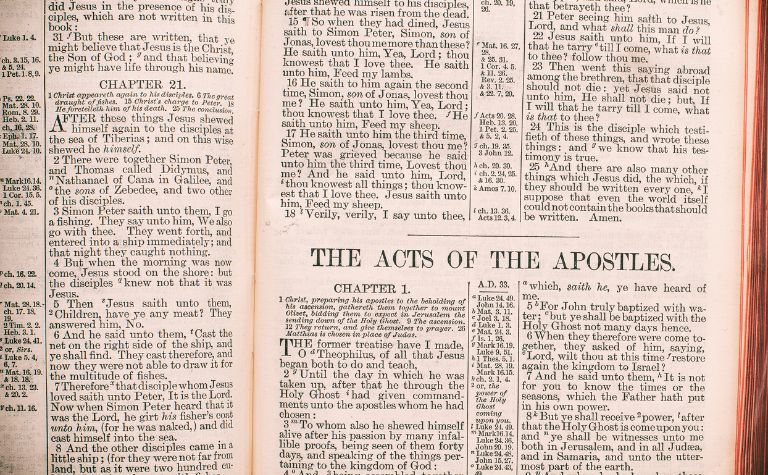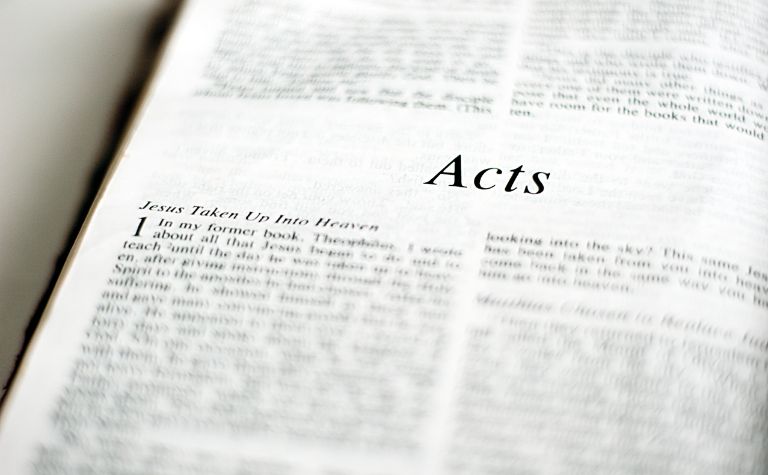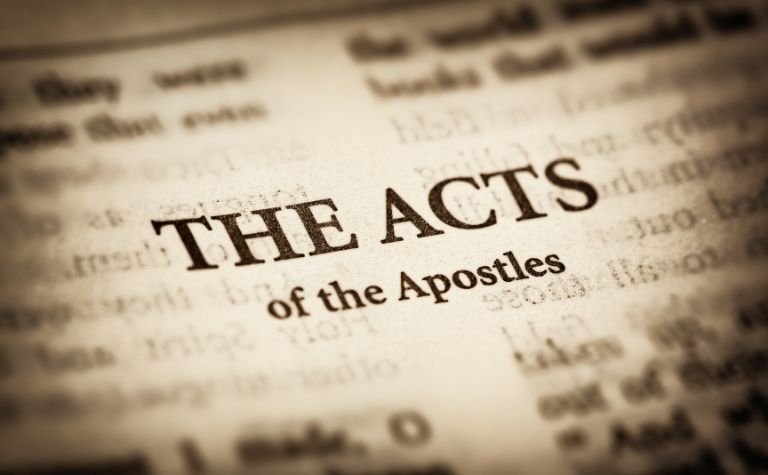In the Bible, Acts is the 5th book in the New Testament. Its traditional title is “The Acts of the Apostles,” though its content persuades many readers that it could also be “The Acts of the Holy Spirit.” The book of Acts plays a pivotal role in the story of Jesus and his followers, beginning where the four Gospels end. This fact makes many people wonder who wrote the book.
The Book of Acts doesn’t directly identify its author. However, internal evidence, like the four so-called “we” passages, points to the Gospel writer, Luke. Additionally, the first citations of Acts in the Christian church are unanimous in their declaration that Luke is the author.
What are two strong internal arguments for Luke’s authorship of Acts? What are the “we” passages, and why do scholars call them that? Who did the leaders in the early church think the author of Acts was? When and why did critics challenge the traditional view? Keep reading to learn the answers to these questions and others.
Also, see Who Wrote the Book of Hebrews? to learn more.

Two internal arguments for Luke being the author of Acts
Internal arguments for a book’s author are reasons found in the biblical text itself that suggest the identification of a particular writer. External arguments for an author are those outside the text.
Luke and Acts have similar introductions
The Gospel of Luke and the Book of Acts have similar introductions, especially in that they address the same person, Theophilus. Many scholars consider Luke “Volume 1” and Acts “Volume II.” For example, the introduction to Acts clarifies that the book is a continuation of Luke’s Gospel.
In Luke 1:3, the writer mentions the recipient, “It seemed good to me also, having followed all things closely for some time past, to write an orderly account for you, most excellent Theophilus” (ESV).
Then, the first verse in Acts addresses the same recipient and refers to the first book (i.e., the Gospel of Luke). “In the first book, O Theophilus, I have dealt with all that Jesus began to do and teach” (Acts 1:1).
The “we” passages in Acts point to Luke’s authorship
In a passage commonly referred to as Paul’s “Macedonian call,” observant readers notice that Luke shifts from the third-person plural (“they”) to the first-person plural (“we”). The implication is that he joined the group at some point but doesn’t identify when because his presence isn’t the story’s purpose.
Acts 16:8-10 reads. “So, passing by Mysia, they went down to Troas. And a vision appeared to Paul in the night: a man of Macedonia was standing there, urging him and saying, ‘Come over to Macedonia and help us.’ And when Paul had seen the vision, immediately we sought to go on into Macedonia, concluding that God had called us to preach the gospel to them” (ESV).
The “we” passages in Acts reveal that Luke was an eyewitness to some of the events in the book. His relationship with other church leaders, especially Paul, and disciples, including Mary, Jesus’ mother, explain how he knows the other stories he tells. The other “we” passages include 20:5-15, 21:1-18, and 27:1-28:16.
One Bible scholar writes, “The natural reading of these passages is that the author of Acts was present during the events he narrates in these passages and that he kept a diary or itinerary report that he incorporates into the Book of Acts.” [1]
Also, see Who Wrote the Book of Romans? to learn more.

The Early Church Identified Luke as Acts’ Author
The Muratorian Canon, which identifies books that the church recognized as those God had inspired, includes the Gospel of Luke and Acts and identifies “Luke the physician” as their author. [2]
The early church identified Luke as the author of Acts. It was a declaration with no rivals. Church leaders who affirmed Luke’s authorship include Irenaeus (130-202 A.D.), Clement of Alexandria (150-215), Tertullian (155-220), and Eusebius (260-339).
Carson and Moo explain, “Luke’s authorship of these two books [Luke and Acts] went virtually unchallenged until the onset of critical approaches to the New Testament at the end of the eighteenth century. Since then, doubt about the tradition has been widespread.” [3]
Also, see Who Wrote the Book of Proverbs? to learn more.

Who was Luke?
The New Testament contains little biographical information about Luke, partly because he wasn’t an apostle. In the book of Colossians, Paul implies that Luke is a Gentile because he doesn’t identify him as part of the “men of circumcision” (Col. 4:11) but then mentions him a few verses later.
Paul refers to Luke as a physician: “Luke the beloved physician greets you, as does Demas” (Col. 4:14). In this verse, readers can also detect the admiration that Paul and Luke had for each other. Tradition indicates that he was Greek and single with no children. When he decided to follow Jesus Christ is unknown.
The early church fathers, Jerome and Eusebius, wrote that Luke was from Antioch. If this is true, it explains why he referred to the city so often (Acts 11:19-27; 13:1-3; 14:26; 15:22, 35; 18:22).
Why Do Some Believe Luke Isn’t the Author of Acts?
How do skeptics explain the “we” passages? Most arguments against the traditional view say that the author (whoever he is) accidentally lapsed into the first-person plural “we.”
Another theory is that the author is combining sources in these passages, shifting from one that says “they” to another than says “we,” but doesn’t identify his sources or make his readers aware that he is using them.
Other critics suggest that someone wrote Acts much later than Luke’s lifetime. Some arguments contend Paul in Acts has a different theology than he does in his letters, which may indicate that Acts had many editors, some of whom had alternative beliefs on topics like the Law.
Critics of the traditional view agree that Luke didn’t write Acts, but they don’t have the same perspective on why he didn’t and who the real author is.
New Testament scholar David Peterson summarizes: “Considering the strong, early Christian evidence for Luke as the author of the Third Gospel and Acts, and the appropriateness of this tradition with reference to the internal data of the NT itself, there are good reasons for concluding that the traditional solution is reliable and true.” [4]
Also, see Who Wrote the Book of Revelation? to learn more.
References:
[1] An Introduction to the New Testament by D.A. Carson and Douglas Moo. 290-291.
[2] The Acts of the Apostles by David G. Peterson. p. 1.
[3] Carson and Moo. p. 291.
[4] Peterson. p. 4.
Related Questions
Regular Bible reading is a valuable habit, as Scripture is God's message to people. However, the Bible's 66 distinct books, featuring various authors, settings, and themes, can make it challenging...
There are 66 individual books in the Bible. There are 39 in the Old Testament and 27 in the New Testament. Many readers can read the shortest books in the Bible in 5 to 10 minutes. The longest book...
